election2020
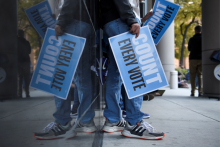
The Electoral College has racist origins. Southern states were granted votes for three-fifths of their slave populations, even though those enslaved people were themselves unable to vote. This effectively gave white southerners an outsized influence on the electoral process until the end of the Jim Crow era. Today, the system favors voters in a small group of battleground states at the expense of most Americans and over-represents white voters while ignoring many voters of color. A growing chorus of legal and policy experts, along with the majority of Americans, believe it should change. However, the Electoral College’s racist legacy has also impacted efforts to change it.
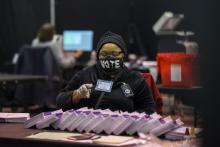
Because of the COVID-19 pandemic, mail-in voting has increased drastically in the 2020 election. Of the almost 100 million votes cast before Election Day, nearly 64 million of those were mail-in ballots. Though states have different rules and methods for mail-in ballots, voters across the country encountered a new question this election: “How do I know my vote was counted?”
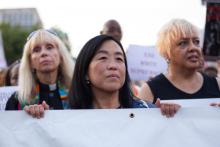
According to a recent survey, nearly 70 percent of people in the U.S. are worried voters will be harassed or intimidated on Election Day; the same survey found that more than three-quarters of Americans worry there will not be a peaceful transition of power after the election. But community leaders and clergy are determined to avoid a violent outcome.
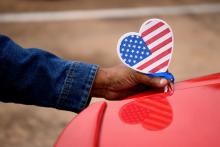
While groups like CatholicVote and others have narrowed in on pro-life, pro-Trump messaging, many other Catholic groups are urging Catholics to think more holistically when they enter the voting booth. “Pro-life,” they argue, extends to honoring the dignity all life from the womb to the tomb, which behooves voters to consider issues like health care, housing, education, racism, climate justice, migration, and criminal justice reform while voting.

"It shouldn't be hard to vote in America in 2020, even with a pandemic."
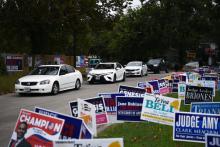
On Oct. 31, a coalition of faith groups worked together to launch a sign-on letter calling on faith leaders to condemn the effort to toss more than 100,000 Harris County ballots, saying counting every vote “matters in the eyes of our state, our country, and our God.” The sign-on process is hosted by Vote Common Good, a national organization encouraging Christian voters to vote Trump out.
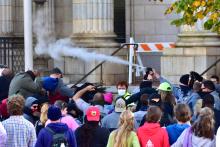
Peaceful participants at a rally in a small North Carolina city to turn out the vote ahead of Tuesday's U.S. presidential election were pepper-sprayed by law enforcement officials on Saturday, according to videos broadcast online and witnesses.
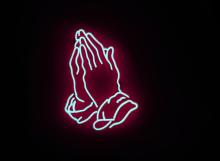
As Election Day nears, one thing is clear: We all need as many prayers as possible. After you vote, while you wait in line to vote, or while you anxiously tune in as votes are tallied, here are places that you can pray on Election Day.
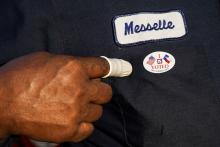
Through Thursday, 9,009,850 have voted so far this year, with one day of early voting left. That amounts to 53 percent of registered voters. In 2016, 8,969,226 Texans cast a ballot in the presidential race.
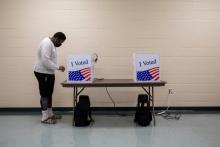
Racism is on the ballot next week. Democracy is on the ballot next week. These two things two are inextricably linked because racism has disfigured American democracy from the founding of our nation. The road to a more perfect union has been long and uneven. And this road requires that we continually become a more perfect democracy and more just nation. And while our democracy will never be perfect, we must continually defend the rights, institutions, and laws that help safeguard our freedoms and advance the common good. Increasingly this election represents a test of whether we embrace and will work to realize a truly inclusive, multiracial democracy with liberty and justice for all.
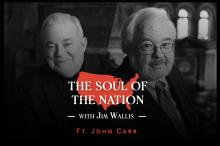
Rev. Jim Wallis speaks with the founder and director of the Initiative on Catholic Social Thought and Public Life at Georgetown University, John Carr.
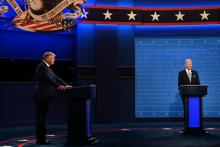
In the 2020 election cycle, most of the Democratic primary candidates provided videos, including Vice President Joe Biden. The Christian leaders in the Circle of Protection have asked for a video and/or statement on poverty policy from President Trump, but his campaign has not responded to repeated requests.
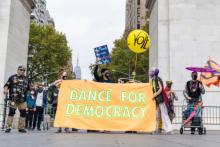
Here’s some hopeful news: Voters are turning out in droves across the country in advance of next Tuesday’s election. According to the United States Elections Project, as of Oct. 28, more than 74,000,000 Americans have voted: that’s more than half of the total votes counted in the 2016 election. Cities like Chicago are breaking their early voting records. New York City’s overwhelmed poll centers added additional hours for the weekend before Election Day. Youth voter turnout is up overall, and Texas is leading with the biggest youth vote participation in the country.
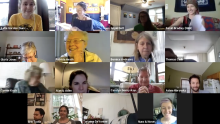
Behind the scenes, in prayer, organizing, poll-working, and demonstrating, Catholic sisters are participating in a milieu of ways that haven’t gone viral.
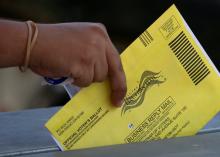
The Supreme Court on Wednesday dealt setbacks to Republicans by allowing extended deadlines for receiving mail-in ballots in next Tuesday's election in Pennsylvania and North Carolina, states pivotal to President Donald Trump's re-election chances.
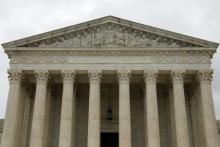
The Supreme Court on Wednesday rejected a request by President Donald Trump's campaign to block North Carolina's extension of the deadline for receiving mail-in ballots in the latest voting case ahead of Tuesday's election.

“Nine times out of 10, we’ll just be greeting people and passing out water and snacks,” said Billy Michael Honor, who directs Loose the Chains, the faith engagement initiative of The New Georgia Project “But in the event that something does happen, it’s good to have people there who know how to lead people in situations of conflict or crisis.”
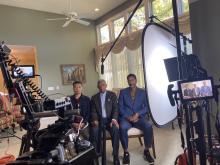
In an effort to call faith-based communities to action during the 2020 election season, his grandson Rev. Dr. Otis Moss III, pastor of Chicago’s Trinity United Church of Christ, shares his family’s story in the 14-minute film, Otis’ Dream.
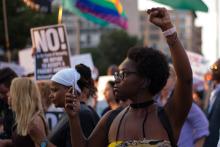
People of diverse faiths have a moral obligation to protect the integrity of the election. Right this minute, people all across the country are voting early or by mail, or making plans to vote in person. As religious and spiritual leaders, we are prepared to take to the streets peacefully if it becomes clear that votes are not being counted or if a legitimate election outcome is being subverted.

Chris has attended the same local church for five years. When services went remote due to the coronavirus pandemic, Chris and his partner noticed paid staff of the church sharing misinformation about hydroxychloroquine on social media. Chris hoped that the church leadership, including the pastor, would push back.